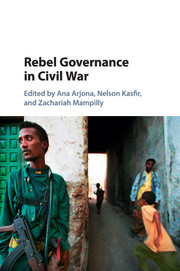Book contents
- Half title page
- Title page
- Copyright page
- Contents
- Contributors
- Book part
- 1 Introduction
- 2 Rebel Governance – Constructing a Field of Inquiry: Definitions, Scope, Patterns, Order, Causes
- 3 Del Gobierno de Abajo al Gobierno de Arriba …and Back: Transitions to and from Rebel Governance in Latin America, 1956–1990
- 4 Performing the Nation-State: Rebel Governance and Symbolic Processes1
- 5 Rebel Diplomacy: Theorizing Violent Non-State Actors’ Strategic Use of Talk
- 6 Rebel Governance During the Greek Civil War, 1942–1949
- 7 Comparing Rebel Rule Through Revolution and Naturalization: Ideologies of Governance in Naxalite and Naga India
- 8 Myths Set in Motion: The Moral Economy of Mai Mai Governance
- 9 Civilian Resistance to Rebel Governance1
- 10 Dialogue Direct:Rebel Governance and Civil Order in Northern Côte d’Ivoire
- 11 The Rebel State in Society: Governance and Accommodation in Aceh, Indonesia1
- 12 Organization and Governance: The Evolution of Urban Militias in Medellín, Colombia
- 13 Predatory Rebellions and Governance: The National Patriotic Front of Liberia, 1989–1992
- 14 Conclusion
- Index
- References
10 - Dialogue Direct:Rebel Governance and Civil Order in Northern Côte d’Ivoire
Published online by Cambridge University Press: 05 October 2015
- Half title page
- Title page
- Copyright page
- Contents
- Contributors
- Book part
- 1 Introduction
- 2 Rebel Governance – Constructing a Field of Inquiry: Definitions, Scope, Patterns, Order, Causes
- 3 Del Gobierno de Abajo al Gobierno de Arriba …and Back: Transitions to and from Rebel Governance in Latin America, 1956–1990
- 4 Performing the Nation-State: Rebel Governance and Symbolic Processes1
- 5 Rebel Diplomacy: Theorizing Violent Non-State Actors’ Strategic Use of Talk
- 6 Rebel Governance During the Greek Civil War, 1942–1949
- 7 Comparing Rebel Rule Through Revolution and Naturalization: Ideologies of Governance in Naxalite and Naga India
- 8 Myths Set in Motion: The Moral Economy of Mai Mai Governance
- 9 Civilian Resistance to Rebel Governance1
- 10 Dialogue Direct:Rebel Governance and Civil Order in Northern Côte d’Ivoire
- 11 The Rebel State in Society: Governance and Accommodation in Aceh, Indonesia1
- 12 Organization and Governance: The Evolution of Urban Militias in Medellín, Colombia
- 13 Predatory Rebellions and Governance: The National Patriotic Front of Liberia, 1989–1992
- 14 Conclusion
- Index
- References
Summary
We tend to believe that rebel governance is based on an excessive use of violence. However, insurgents often establish a regular exchange with civilians under their domination. Building such an exchange affects both sides. It transforms rebel governance into a more civil order that builds on former experiences and incorporates long-lasting modes of communication that oblige both sides to respect the underlying cultural norms and values. This contribution analyses rebel governance in the city of Korhogo in northern Côte d’Ivoire. Since 2002, when a failed coup against President Laurent Gbagbo split the country into two halves, Korhogo was dominated by a stable configuration of rebels and other, mainly neo-traditional actors. The segmentary balance between them was informed by shared norms and values on which new institutions were built, guaranteeing a regular exchange between the parties. “Dialogue direct” was the slogan adopted from national politics to characterize this emerging partnership between rebels and civilians.
- Type
- Chapter
- Information
- Rebel Governance in Civil War , pp. 203 - 225Publisher: Cambridge University PressPrint publication year: 2015
References
- 22
- Cited by



